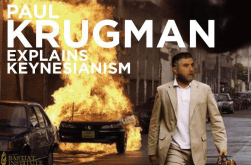Alan Kirman debunking mainstream economics .[embedded content] An economic theory that does not go beyond proving theorems and conditional ‘if-then’ statements — and do not make assertions and put forward hypotheses about real-world individuals and institutions — is of little consequence for anyone wanting to use theories to better understand, explain or predict real-world phenomena. Building theories and models on patently ridiculous assumptions we know...
Read More »Why economics has failed so miserably
Why economics has failed so miserably .[embedded content] The economy is — as emphasised by both Keynes and Soros — pervaded by genuine uncertainty and reflexivity. The uncertainty makes the future difficult to anticipate and reflexivity often makes our expectations about the future something that actually changes the future. They both severely undermine the explanations and predictions that are made within the standard economic models.
Read More »Don’t buy into the inflation scare
Don’t buy into the inflation scare .[embedded content]
Read More »Partiell integration med DI-metoden (student stuff)
Partiell integration med DI-metoden (student stuff) .[embedded content]
Read More »La France en crise
La France en crise .[embedded content]
Read More »Deductivism — the original sin in mainstream economics
Deductivism — the original sin in mainstream economics Mathematics, especially through the work of David Hilbert, became increasingly conceived as a practice concerned with formulating systems comprising sets of axioms and their deductive consequences, with these systems in effect taking on a life of their own … The emergence of the axiomatic method removed at a stroke various hitherto insurmountable constraints facing those who would mathematise the...
Read More »Paul Krugman’s gadget version of Keynesianism
Paul Krugman’s gadget version of Keynesianism Paul Krugman has often been criticized by people like yours truly for getting things pretty wrong on the economics of John Maynard Keynes. When Krugman has responded to the critique, by himself rather gratuitously portrayed as about “What Keynes Really Meant,” the overall conclusion is — “Krugman Doesn’t Care.” Responding to a post up here on this blog, Krugman writes: Surely we don’t want to do economics via...
Read More »Economics — a severe case of misplaced idolatry of ‘rigour’
There is something about the way macroeconomists construct their models nowadays that obviously doesn’t sit right. Empirical evidence — still — only plays a minor role in mainstream economics, where models largely function as a substitute for empirical evidence. One might have hoped that humbled by the manifest failure of its theoretical pretences during the latest economic-financial crises, the one-sided, almost religious, insistence on axiomatic-deductivist modeling as the...
Read More »Top Economics Blogs
Mainstream economics has sadly made economics increasingly irrelevant to the understanding of the real world. Trying to contribute in making economics a more realist and relevant science, yours truly launched this blog in March 2011. Now, ten years later and with millions of page views on it, yours truly is — together with people like e.g. Greg Mankiw and Paul Krugman — ranked on INOMICS’ The Top Economics Blogs list. I am — of course — truly awed, honoured and delighted....
Read More »Randomization — method or madness?
Randomization — method or madness? Bill Gates has recently been promoting chicken ownership to address poverty in Africa. In an open letter, Professor Blattman of University of Chicago pointed out that cash transfers may be more cost effective than chickens said: “It would be straightforward to run a study with a few thousand people in six countries, and eight or twelve variations, to understand which combination works best, where, and with whom. To me that...
Read More » Heterodox
Heterodox





